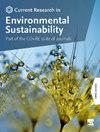Corporate governance characteristics of Japanese manufacturing companies and ISO 14001 adoption by their subsidiaries in Thailand
Abstract
Companies have reported some voluntary initiatives such as obtaining an ISO 14001 certification to solve environmental problems and to achieve United Nation's Sustainable Development Goals. While ISO 14001 adoption has been studied extensively on the case of parent companies, there is not much prior research related to the parent-subsidiary relationship. This paper attempts to answer the question why Japanese subsidiaries in Thailand obtain ISO 14001 certification by focusing on corporate governance characteristics of Japanese parent companies such as board diversity and on the share of voting rights in their subsidiaries. We perform a logistic analysis using panel data from 117 subsidiaries in three industrial sectors (rubber products, machinery, and precise machinery) in 2017–2020. We find that characteristics such as direct voting rights in the subsidiaries and long business history of the parent companies have a strong positive correlation with ISO 14001 adoption by their subsidiaries in Thailand. The proportion of independent directors on the parent companies' boards exhibits only a slightly positive correlation. By contrast, our findings show no correlation with the proportion of female directors on the parent companies' boards due to the gender inequality gap in Japan. Our findings contribute to the empirical literature about voluntary environmental management in developing countries with regard to the parent-subsidiary relationship.

 求助内容:
求助内容: 应助结果提醒方式:
应助结果提醒方式:


